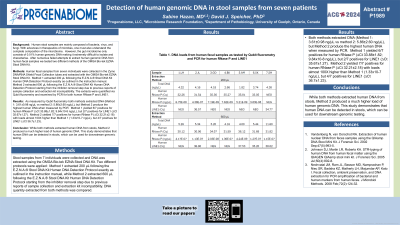Monday Poster Session
Category: Colon
P1989 - Detection of Human Genomic DNA in Stool Samples From Seven Patients
Monday, October 28, 2024
10:30 AM - 4:00 PM ET
Location: Exhibit Hall E

Has Audio

Sabine Hazan, MD
ProgenaBiome
Ventura, CA
Presenting Author(s)
David Speicher, PhD1, Sabine Hazan, MD2
1University of Guelph, Guelph, ON, Canada; 2ProgenaBiome, Ventura, CA
Introduction: Human stool samples are mainly composed of bacteria, virus, and fungi. With advances in therapeutics of microbes, one must also understand the complete composition of the microbiome. However, the gut microbiome only consists of 0.01% human genomic DNA making it extremely difficult to isolate and characterise. After numerous failed attempts to extract human genomic DNA from human fecal samples we tested two different methods of the OMGA Bio-tek EZNA Stool DNA Kit.
Case Description/Methods: Human fecal samples from seven individuals were collected in the Zymo DNA/RNA Sheild Fecal Collection tubes and extracted with the OMGA Bio-tek EZNA Stool DNA Kit. Method 1 extracted 200 µL following the E.Z.N.A.® Stool DNA Kit Human DNA Detection Protocol exactly as outlined in the instruction manual. Method 2 extracted 600 µL following the E.Z.N.A.® Stool DNA Kit Human DNA Detection Protocol starting from the inhibitor removal step due to previous reports of sample collection and extraction kit incompatibility. The extracts were quantified via Qubit fluorometry and examined by PCR for both human RNase P and LINE1.
Discussion: As measured by Qubit fluorometry both methods extracted DNA (Method 1: 3.61±0.98 ng/µL vs method 2: 5.86±2.60 ng/µL), but Method 2 produce the highest human DNA when measured by PCR. Method 1 yielded 6/7 positives for human RNase P (DCt 33.88±1.82; 9.84x10-8 ng/µL), but 2/7 positives for LINE1 (DCt 35.67±1.27). Method 2 yielded 7/7 positives for human RNase P (DCt 32.21±2.18) with loads almost 100X higher than Method 1 (1.33x10-7 ng/µL), but 4/7 positives for LINE1 (DCt 36.7±1.23). While both methods extracted human DNA from stools, Method 2 produced a much higher load of human genomic DNA. This study demonstrates that human DNA can be detected in stools, which can be used for downstream genomic testing.
Note: The table for this abstract can be viewed in the ePoster Gallery section of the ACG 2024 ePoster Site or in The American Journal of Gastroenterology's abstract supplement issue, both of which will be available starting October 27, 2024.
Disclosures:
David Speicher, PhD1, Sabine Hazan, MD2. P1989 - Detection of Human Genomic DNA in Stool Samples From Seven Patients, ACG 2024 Annual Scientific Meeting Abstracts. Philadelphia, PA: American College of Gastroenterology.
1University of Guelph, Guelph, ON, Canada; 2ProgenaBiome, Ventura, CA
Introduction: Human stool samples are mainly composed of bacteria, virus, and fungi. With advances in therapeutics of microbes, one must also understand the complete composition of the microbiome. However, the gut microbiome only consists of 0.01% human genomic DNA making it extremely difficult to isolate and characterise. After numerous failed attempts to extract human genomic DNA from human fecal samples we tested two different methods of the OMGA Bio-tek EZNA Stool DNA Kit.
Case Description/Methods: Human fecal samples from seven individuals were collected in the Zymo DNA/RNA Sheild Fecal Collection tubes and extracted with the OMGA Bio-tek EZNA Stool DNA Kit. Method 1 extracted 200 µL following the E.Z.N.A.® Stool DNA Kit Human DNA Detection Protocol exactly as outlined in the instruction manual. Method 2 extracted 600 µL following the E.Z.N.A.® Stool DNA Kit Human DNA Detection Protocol starting from the inhibitor removal step due to previous reports of sample collection and extraction kit incompatibility. The extracts were quantified via Qubit fluorometry and examined by PCR for both human RNase P and LINE1.
Discussion: As measured by Qubit fluorometry both methods extracted DNA (Method 1: 3.61±0.98 ng/µL vs method 2: 5.86±2.60 ng/µL), but Method 2 produce the highest human DNA when measured by PCR. Method 1 yielded 6/7 positives for human RNase P (DCt 33.88±1.82; 9.84x10-8 ng/µL), but 2/7 positives for LINE1 (DCt 35.67±1.27). Method 2 yielded 7/7 positives for human RNase P (DCt 32.21±2.18) with loads almost 100X higher than Method 1 (1.33x10-7 ng/µL), but 4/7 positives for LINE1 (DCt 36.7±1.23). While both methods extracted human DNA from stools, Method 2 produced a much higher load of human genomic DNA. This study demonstrates that human DNA can be detected in stools, which can be used for downstream genomic testing.
Note: The table for this abstract can be viewed in the ePoster Gallery section of the ACG 2024 ePoster Site or in The American Journal of Gastroenterology's abstract supplement issue, both of which will be available starting October 27, 2024.
Disclosures:
David Speicher indicated no relevant financial relationships.
Sabine Hazan: Microbiome Resarch Foundation – Owner/Ownership Interest. Microbiome Research Foundation – Owner/Ownership Interest.
David Speicher, PhD1, Sabine Hazan, MD2. P1989 - Detection of Human Genomic DNA in Stool Samples From Seven Patients, ACG 2024 Annual Scientific Meeting Abstracts. Philadelphia, PA: American College of Gastroenterology.
